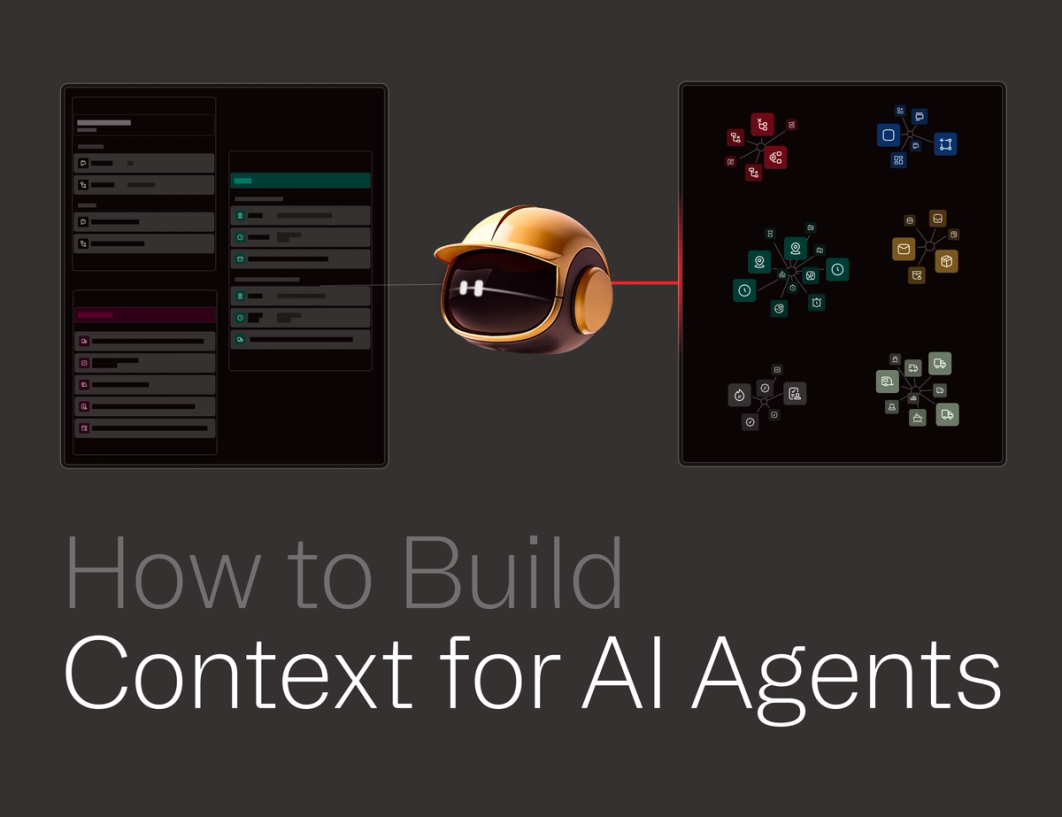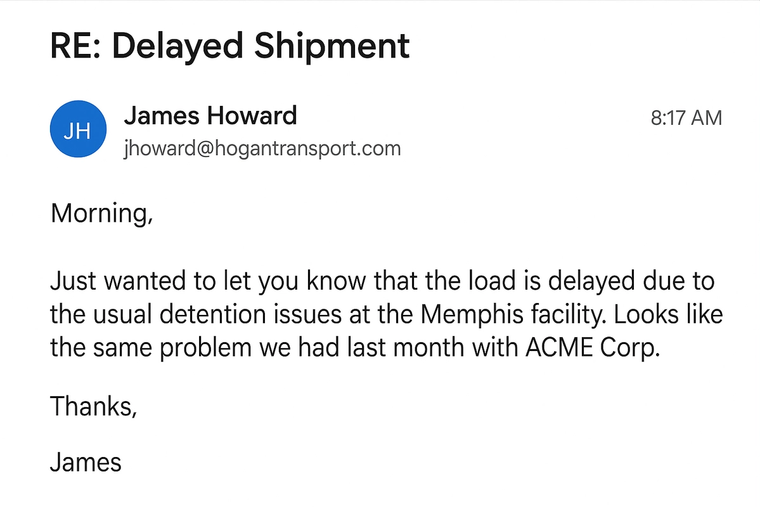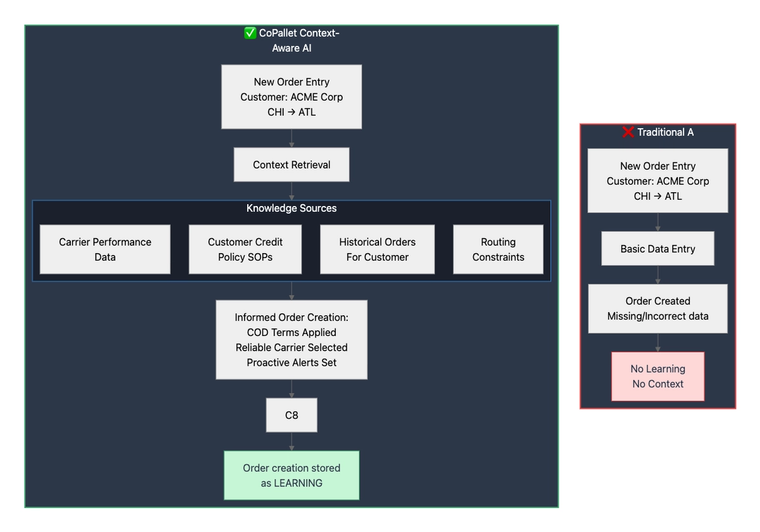How to Build AI Agents with a Truckload of Context



Emails like this arrive in freight broker inboxes every week. A carrier reports another delay: detention at the Memphis facility, the same recurring bottleneck as last month with ACME Corp, and the clock already past four hours.
The text of the email is only a thin slice of the real context. Freight brokers know that behind this single message lies a broader pattern: this carrier’s history of detention issues at Memphis, ACME Corp’s chronic receiving dock delays, and a policy rule that triggers immediate customer notification once detention hits the four-hour mark.
This contextual awareness separates experienced freight brokers from novices. They operate with accumulated wisdom from thousands of interactions, company policies, and industry patterns. Building AI agents that can replicate this contextual sophistication is one of the core problems we've been tackling at Pallet.
The Tribal Knowledge Problem in Logistics
The logistics industry runs on tribal knowledge: the unwritten rules, learned patterns, and accumulated wisdom that experienced operators carry in their heads. This knowledge rarely makes it into official documentation, yet it's critical for effective operations.
Consider an AI agent processing a new order entry for ACME Corp shipping from Memphis to Atlanta. A basic implementation validates the shipment details, checks required fields, and creates the order with standard terms. But this misses the layers of tribal knowledge that an experienced dispatcher would automatically apply:
- Unwritten customer rules: "ACME always says 'urgent' but really means standard delivery. They also never answer their phones after 3 PM EST, so any issues need morning calls."
- Carrier tribal knowledge: "Don't use Carrier XYZ for ACME shipments. They had that billing dispute six months ago that's still unresolved. Carrier ABC works great but always runs a day late on this lane due to their Chicago terminal operations."
- Facility-specific insights: "ACME's Atlanta receiving dock closes early on Fridays and they don't accept deliveries during their monthly inventory count (always first week of the month). Their dock supervisor Joe prefers text updates over calls."
- Operational patterns: "This route always has delays during storm season. The I-65 corridor through Kentucky gets backed up every morning, so schedule accordingly."
This tribal knowledge represents years of accumulated experience that makes the difference between smooth operations and constant firefighting. When AI agents lack this context, they create orders that meet the basic requirements but are incomplete because they ignore the nuances of logistics operations.
How CoPallet Transforms Tribal Knowledge into Contextual Intelligence

We've built a Memory Layer that transforms tribal knowledge into contextual intelligence for AI agents, following a clear pipeline: documents (codified procedures) get ingested and chunked, memories are created with rich metadata, and reasoning nodes retrieve relevant context to make informed decisions.
CoPallet mirrors how strong operators learn and apply knowledge on the job. Instead of just storing data, it turns scattered tribal knowledge into actionable intelligence for AI agents. This process mirrors training and coaching a new employee. The process follows three core stages:
1. Ingesting Tribal Knowledge (like onboarding a new employee)
When a new hire joins a brokerage, they’re handed SOPs, spreadsheets, and the unwritten rules passed down from senior reps. CoPallet does the same, automatically ingesting documents, emails, and notes into a searchable memory bank. Each piece of knowledge becomes a memory with an embedding and structured metadata (customers, facilities, contacts, policies).

2. Learning Through Interventions (like employees being corrected over time)
Onboarding only gets an employee so far—real growth comes when they make mistakes and are corrected. A dispatcher might schedule ACME for a morning delivery, only to be told “they don’t unload until after 1 PM.” A strong employee doesn’t just fix it once; they internalize the rule.
CoPallet follows the same principle. Every AI decision is logged, and when a human overrides or corrects it, that intervention is captured as a new memory. Over time, the system learns patterns such as:
- “Never schedule ACME Corp before 1 PM.”
- “Flag detention if Memphis facility wait exceeds 4 hours.”
- “DEF carrier is reliable for afternoon runs.”
These corrections aren’t ephemeral—they’re stored with metadata about the customer, facility, or lane involved. That way, the next time a similar situation comes up, the AI has not only the formal SOPs but also the accumulated lessons of every correction that’s ever been made.
This turns interventions into institutional memory, making CoPallet better with every decision just like a seasoned rep who never makes the same mistake twice.
3. Retrieval and Decision-Making with Context (like a seasoned operator knowing what really matters)
The best operators don’t throw every rule into a decision; they know which ones apply. CoPallet’s reasoning nodes mirror this by combining semantic and structured search to retrieve the right pieces of tribal knowledge based on the order context.
const relevantMemories = await Promise.all([
// Semantic search finds conceptually related knowledge
memoryService.search({
type: 'SEMANTIC',
content: 'ACME Corp Chicago Atlanta delivery preferences carrier performance',
organizationId,
filters: {
types: ['DOCUMENT_CHUNK', 'EMAIL_RECEIVED', 'LEARNING'],
entities: { customerNames: ['ACME Corp'] }
},
limit: 8
}),
// Structured search for specific operational data
memoryService.search({
type: 'STRUCTURED',
organizationId,
filters: {
types: ['DOCUMENT_CHUNK', 'HUMAN_INTERVENTION'],
entities: {
customerNames: ['ACME Corp'],
routes: ['CHI-ATL', 'Chicago-Atlanta']
}
},
limit: 5
})
]);For an ACME Corp CHI–ATL shipment, retrieval surfaces operational variations like:
- “ACME prefers afternoon appointments”
- “Avoid morning delivery windows”
- “Receiving dock opens at 1 PM”
- “Carrier DEF is 95% reliable for afternoons”
The AI then synthesizes this into a decision: Book Carrier DEF and schedule delivery at 2 PM per documented preferences.
Just like employees who get better with experience, CoPallet improves with every interaction. Each decision feeds back into the memory system, capturing both the reasoning process and the outcome. This creates a loop of ingestion, learning, and retrieval that compounds over time.
Looking Forward: Scaling Intelligence That Actually Works
The difference between AI that demos well and AI that works in production is context. A freight broker doesn't just process transactions. They operate with decades of collective industry wisdom, organizational knowledge, and learned patterns that turn chaotic logistics operations into predictable outcomes.
At CoPallet, we've built infrastructure that gives AI agents access to this same contextual foundation. The result is augmented intelligence that scales human expertise rather than replacing it.
Ready to build AI that understands the real world? We're looking for engineers who want to tackle the hardest problems in applied AI: Capturing tribal knowledge, scaling contextual reasoning, and building systems that actually work in the coffee-stained world of logistics operations.

